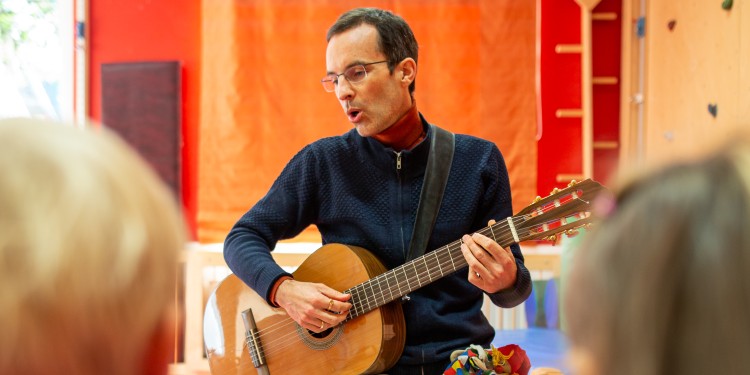
"I didn’t want to give up on the children"
The beginning could easily have been the end. When Dr. Rainer Edelbrock, a freelance lecturer at the Institute of Musicology, began his project at a kindergarten in a deprived area, the chances of success did not look good. The idea was that Edelbrock, a music teacher and music therapist, would use music therapy in working with children from a deprived background – in other words, enable them to express themselves and to develop by means of music and play. That, at least, was the plan and the good intentions. But what happened, in brief, was: "The children deconstructed my project in a very short space of time and threw it back in my face with a degree of aggression I had never encountered before," Edelbrock recounts. He had been successful in his work in other kindergartens, but now he thought of giving up and said so to Rosemarie Tüpker, Professor of Music Therapy at the University of Münster. "She said that the children knew only too well the experience of other people giving up on them," he says, "and then I realised that I didn’t want to give up on these children." So he stayed – seven whole years, ultimately, in which he wrote about the project for his PhD dissertation entitled "Royal Children – Music Therapy with Pre-School Children from Deprived Backgrounds". The Society for Cultural Psychology (Gesellschaft für Kulturpsychologie) recently awarded him the Ernst E. Bosch Prize 2021 for his scientific work in this field.
Some of the children had had traumatic experiences during migration. Others have experienced emotional and physical abuse, or poverty or violence. What they all had in common, says Edelbrock, was a strong feeling of being different. "What this meant," he says, "was that any possibility of a healthy development was at risk, as was their self-image." Their aggressive behaviour towards other children, towards the therapist and towards the musical instruments was not only an expression of this threat they felt under, he explains, but at the beginning it also made any musical game impossible. The five- to six-year-olds were lacking in decisive steps in their development: they couldn’t share with one another or wait their turn. "It was anarchy," the 46-year-old Edelbrock recalls. Relations between him and the kindergarten children developed slowly – "not like in a Hollywood film in which everything suddenly takes a turn for the better." He had to learn what the children needed for them to follow the music therapy and its structures. "They required a greater degree of authority than I was used to from my own childhood and in my work as a music therapist." He got through to the children by changing his internal attitudes and his outer bearing.
"A greeting song I thought up gave them an opportunity to express what was on their mind at that moment or what they wished for," Edelbrock recounts. This dealt with concrete situations – for example, that someone had annoyed them, or fantasies such as being able to fly like Superman. In other words, Edelbrock geared his lessons to the situational needs of the group. "The children had a strong demand for games involving stories like fairy-tales – in other words, musical role-plays," he says. This dynamic guided him towards a new method of working, which he made the subject of his PhD. At the centre of this approach is the metaphor of a kingdom, in which there appear various archetypal places and figures which each represent specific thematic areas in developmental psychology: the king, the queen and the royal children, the court jester, the forest or the palace. "An archetype is not what we see as a cultural act, but rather the underlying psychological structure which produces the phenomenon," Edelbrock explains. This, he says, is why archetypes transcend cultures. "Before I recognised the archetypal structures of the role-plays, I was surprised why children from different cultural backgrounds understood all these images of kings, princesses or magicians." Subsequently, in his PhD, he linked insights from developmental psychology to these archetypal structures. "I was able to show that working with children from deprived areas was a form of cultural acquisition in the sense of depth psychology."
In the role-plays – using hand puppets, for example – a key figure was always the court jester. So Rainer Edelbrock looked into Carl Gustav Jung, the founder of Analytical Psychology. Jung had discovered that this archetype already existed in old indigenous cultures of North America, among others. "The court jester crops up everywhere, all over the world. He represents the anarchically uncultured side of humans. That was something that these children could identify with especially," says Edelbrock. Although the jester was popular with other children and adults, what was striking, he says, was the extent to which the disadvantaged children really worked on this figure. "The jester looks at the world in a childlike, naïve way, is free of cultural characteristics, never judges, and is never nasty. The children loved him, hated him, beat him, and married him." In his PhD, Edelbrock comes to the conclusion that, by confronting archetypes in role-plays, the children found ways of expressing their feelings. In time, he says, they were able to share with one another and to wait their turn. These were important steps in the acquisition of culture as understood in depth psychology. "What impressed me especially was that ultimately the children were able to talk about what they felt, negotiate things and, in this way, play out democratic processes."
Author: Hanna Dieckmann
This article first appeared in the University newspaper “wissen|leben” No. 6, 6 October 2021
